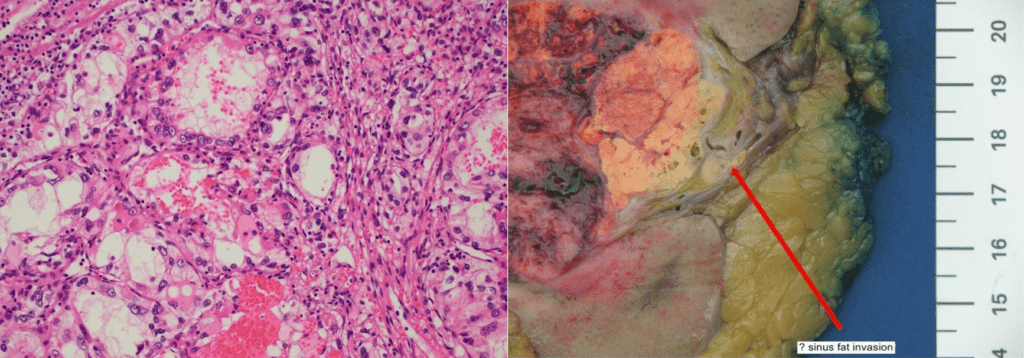What are kidney stones?
What is stone disease?
Stones in the urinary tract (urolithiasis) are a very common condition in the hot Australian climate. In this condition, stones (calculi) form within the urine from progressive growth of small crystals. Men are affected more than women (60:405), and recurrence is common, with roughly 50% of patients having further stones within the next decade.
Due to modern dietary changes and increasing body weights, the kidney stones are becoming more common. Children and young adults can also be affected by the condition.
What causes kidney stones?
The human body has 2 kidneys that lie on your back, just below the rib cage. Their role is to filter the blood and remove the body’swaste products. In order to effectively do this, it is important for people to maintain well hydrated. If a person is dehydrated, there is an excess of waste material, or an imbalance of salts & minerals, then the urine the kidneys produce is too concentrated. As a general principal, urine should appear nearly clear. If it is yellow, you may be drinking too little water, or potentially consuming minerals that the body can’t absorb (and thus needs to flush out).
When the urine is too concentrated, crystals can form due to this imbalance between the water component of the urine and the dissolved body waste. Over time, these crystals then merge together to form stones, which when large enough can then cause the symptoms of renal colic.
What are the symptoms of stone disease?
The symptoms of stones vary depending upon the location & size of the stones.
If the stones are small & present only in the kidneys, many patients may not experience any symptoms at all. These stones are often innocent bystanders and discovered incidentally whilst others problems are being investigated. However, if these small stones grow, they may start to rub and cause symptoms.
Once stones fall from the kidney and cause a blockage in the ureter (urine pipe) then symptoms are common.
The classic symptom of a kidney stones is renal colic, which is due to the blockage in the usual flow of urine from the kidney to the bladder.
Renal colic = Severe Pain, Nausea & Vomiting
Other symptoms of kidney stones can include:
- Blood in the urine
- Infections / sepsis
- Kidney failure
Renal colic is thus a common cause of Emergency Department attendance, with patients potentially needing IV pain relief and emergency surgery.
Symptoms
- Severe loin to groin pain
- Back pain
- Nausea
- Sweats
- Urge to urinate
- Blood in the urine
Diagnosis
CT KUB – a CT scan of the kidneys, ureters and bladder.
In order to detect kidney stones only a very low X-ray dose is required. With modern equipment, this is even safe to do even in pregnancy! However, out of an abundance of caution for most pregnant women an ultrasound is routinely used instead.
A CT KUB accurately help to determine the location & number of stones, their size, and the best form of treatment.
Whilst there are many potential medical causes for kidney stones, as a general principal the excess concentration of dissolved salts in the urine is key.
Thus:
- Drink more water
- Limit caffeine and soft drink
- Avoid excess body weight
Kidney Stone Treatments
How are kidney stones treated?
There are several treatment options available.
If patients are presenting via an emergency department, Dr Symons will consider not only the stone that requires urgent treatment, but also if there are any other stones that could be pre-emptively to avoid future issues.
Private patients benefit significantly from a shorter treatment pathway. Safe kidney stones treatment may require several staged procedures, with a stent placement between operations. SydneyUro offers multiple operating sessions per week, thus allowing for a rapid resolution to all kidney stone issues, regardless of complexity and size. This permits an early return to work, minimal pain, and no issues with stent encrustation.
Dr Symons takes a holistic view to kidney stone treatment and will work with you to prevent future stones from occurring. For some patients, this will be dietary medication, whilst in others this might entail a comprehensive biochemical assessment to check for amedical reason behind the stone’s formation.
Treatment options include:
SydneyUro offers rapid access to both diagnostic imaging, Urological consultation, and treatment.
Dr Symons has multiple operating lists each week in Sydney, offering prompt access to affordable & definitive care, should it be required. This helps to alleviate anxiety, as well as the length of the patient’s treatment pathway.
Dr Symons will consider the specific details of your stone to construct a personalised treatment plan tailored to your individual condition and needs.
Kidney (Renal) Tumours
What are kidney tumours and how are they caused?
Cancers of the kidney are one of the most common types of tumours to affect Australians. They are more common after the age of 50, and due to the higher rate of smoking and occupational exposure, occur more often in men.
Kidney (Renal) tumours are not all the same and are classified based on the cell type they develop from. In general, most renal tumours will either be a RENAL CELL CARCINOMA (RCC) or a UPPER TRACT UROTHELIAL TUMOUR (UTUC). Their diagnosis, treatment and follow-up varies depending on the cell typ.e
Fortunately, due to the widespread use of community ultrasound in Australia for other conditions, the “classical triad” of advanced renal cell tumours are rarely seen, as most tumours are detected incidentally (by chance) when patients are having scans for other ailments. When detected and treated early, the likelihood of permanent cure is excellent.

Classic signs (15% patients only):
- Blood-stained urine (haematuria)
- Palpable abdominal mass (can be felt when pressing over the renal area)
- Loin pain
Other symptoms:
- Abdominal pain
- Tiredness
- “B symptoms”
- Night sweats
- Fever
- Weight loss
- Paraneoplastic symptoms (affecting up to 40% of RCC patients, these are a constellation of systemic signs and symptoms due to the presence of a malignancy and are due to abnormal hormone production or the body’s immune response to the tmpur)
- High calcium levels (Hypercalcemia)
- Hypertension (high blood pressure)
- Anaemia (low blood count)
- Polycythemia (“thick” blood)
- Neuromyopathies (nerve issues)
- Nonmetastatic hepatic dysfunction (liver failure)
- Vasculopathy (tendency to clot)
- Galactorrhea (leaking from the breasts)
- Nephropathy (renal failure)
- Cushing’s syndrome (high Cortisol level)
- Coagulopathy (tendency to bleed)
- Alterations in glucose metabolism
- Urine tests – looking for unusual cells (cytology) that might indicate a UTUC (upper tract urothelial cancer)
- Blood tests
- CT
- Renal tract ultrasound
- MRI
Kidney (Renal) Tumour Treatments
Dr Symons will discuss with his patients at length regarding the most appropriate type of treatment, taking into account the specific features of their tumour and their other general health conditions treatment.

